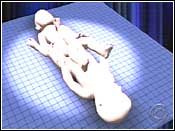
Should One Die To Save The Other? Issue Faces Judges, Ethicists In Case Of Conjoined Twins
LONDON, September 5, 2000
(CBS)
Jodie may live, but only if Mary dies. Doctors want to operate, but the parents prefer to trust the will of God.
Thus, reports CBS News Correspondent Richard Roth, the fate of conjoined twins from Eastern Europe is in the hands of doctors and appeals court judges, who are struggling with the ethical issues.
Speaking of Mary, the twin whose less-developed body depends on her sister for oxygenated blood, Lord Justice Henry Brooke asked Tuesday: "What is this creature in the eyes of the law?"
A lawyer appointed to represent Jodie argued that "there are no best interests in preserving what is unfortunately a futile life."
Jodie and Mary, false names used by the court to preserve the girls privacy_were born Aug. 8 at St. Mary's Hospital in Manchester and are joined at their lower abdomens. Mary's brain and body are less developed than Jodie's and the Manchester medical team says it is highly probable that if left unseparated, both twins will die within six months as Jodie's heart fails.
The parents, who have not been identified, are appealing the Aug. 25 decision by a High Court judge to allow surgeons to separate the twins.
John Kitchingham, attorney for the parents, says they want to let nature take its course. "The children should be allowed whatever life expectancy their medical condition permits. So what we're asking, what we're looking for, is an order which will reflect their wishes and their own view of what is in the best interests of the children."
The girls' fate is in the hands of English law because the parents went there for the birth to give their daughters "the very best chance in the very best place," says another attorney for the parents, Simon Taylor.
Even for experts in medical ethics, it's a stark dilemma.
"The problem is that each of the children, each of the Siamese twins, has an equal right to life," says Dr. Richard Nicholson, editor of The Bulletin of Medical Ethics.
A judge says the question is whether separation surgery amounts to the unlawful killing of the weaker twin. But not everyone is convinced that what's right lies solely in the law.
"I think most people would feel that, at the end of the day if there are two dead children, then that would be a defeat for everybody, both the law and medicine,"says Allen Levy, a children's law expert.
Despite the compelling ethical issues, it has been a subdued case, one with no faces. The parents have not been photographed or interviewed, their home country has not been disclosed and the public has not seen pictures of the twins.
The appeals court, which has asked two specialists from London to travel to Manchester to review the case, granted permission Tuesday for additional scans if needed. The specialists are to report back at the end of the week.
With a life or death decision to make, the judges are asking doctors for a second opinion. Is there a chance the twins could stay joined and still survive? Or, if they're separated, how realistic is the hope at least one of them would be saved?
The court is already deep into the ethical conundrums of the case.
Judith Parker, a barrister appointed to represent Jodie's interests, said Jodie would have a good quality of life and the possibility of a normal life expectancy if she were severed from Mary.
"Jodie is expected to have a normal brain and is of normal intelligence," Parker said. "She might be able to go home two to three months after separation."
The doctor in charge of the twins was identified in court only as Dr. B. He said in court Monday that Mary, who once had been completely passive, now opens her right eye occasionally and had begun to suck, although she could not feed. Her brain was "extremely primitive," he said.
The hospital said it has been bombarded with protests from the public because of the doctors' determination to operate.
Taylor said the parents, who are Roman Catholics, had decided that they could not kill one daughter to allow the other to live.
"We came to England to give our babies the very best chance for life in the very best place," the parents said in a statement read in court Monday.
"Now things have gone very badly wrong and we find ourselves in this very difficult situation. We believe that nature should take its course. If it's God's will that both our children should not survive then so be it."
The parents fear Jodie would suffer and require continuing special care that is not readily available to them, and they are concerned about local attitudes toward disability, their lawyer said.
The judges asked whether Jodie and Mary should be regarded as "one life" in the legal sense a concept that could clear the way for surgery to save Jodie. Taylor argued that the staff at St. Mary's considered the twins as separate individuals.
Lord Justice Alan Ward asked whether the child could be described as "a person in being," since she could not live independently.
He suggested the parents could arguably be guilty of the manslaughter of Jodie if they did nothing, or guilty of the manslaughter of Mary if they consented to surgery.
Adrian Whitfield, an attorney representing Central Manchester Healthcare National Health Service Trust, which operates the hospital, argued that the law had to "balance the conflict of duty."
That meant, he said, that the surgery should be allowed because Jodie has more to lose "in terms of the net gain of life."
Copyright 2000, CBS Worldwide Inc. All Rights Reserved. This material may not be published, broadcast, rewritten, or redistributed. The Associated Press contributed to this report.
This material was originally accessed at http://cbsnews.cbs.com/